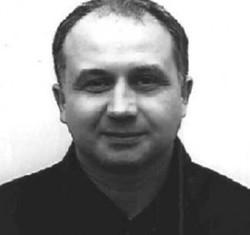In 1997-1998, St. Petersburg law enforcement officers arrested a crime boss nicknamed “Shark” and his entourage. A struggle for their legacy unfolded in the city. There were assassination attempts on the group’s former brigadiers, who continued to control some points. Killers Vadim Izmorosin was shot dead – he left the house with his wife, and their killers received the order to “cut them both down.” In August 1998, another “Akulov” foreman Igor Rozzuvaylo collided on the street with a homeless person – very close to the building of the FSB Directorate for St. Petersburg and the Leningrad Region. The homeless man turned out to be a bandit in disguise – taking out a pistol from under his jacket, he fired three shots into Rozzuvailo’s chest and a control shot into the head. Half an hour later, the car of the third foreman, Gennady Los, exploded – but the killer pressed the button too early, and Los managed to survive. It was he who testified against Vladimir Borisov and his gang – a total of 15 people were detained. Borisov’s henchmen said that he was a former military man nicknamed “Ensign” and had put together a whole gang of special forces people based on the Falcon-95 private security company. According to them, Borisov managed dozens of companies and commanded a gang of killers. Borisov’s organized crime group was suspected of murdering the vice-governor of St. Petersburg Mikhail Manevich, security forces and crime bosses. One of Borisov’s killers in the media at one time called perpetrator of the murder of a State Duma deputy Galina Starovoitova. As Alexander Litvinenko wrotethe gang members learned the techniques of external surveillance and wiretapping from career employees of the GRU and the St. Petersburg FSB Directorate.
The investigation dragged on for many years: due to numerous errors, the case was returned to the prosecutor’s office several times, and the chief investigator, Vadim Pozdnyak, subsequently became bandits’ lawyer. The verdict was handed down only in 2007. By that time, all the defendants had been released, and the case fell apart: Charges of contract killings, extortion and illegal weapons trafficking were dropped due to lack of involvement, lack of corpus delicti or the expiration of the statute of limitations. Four people were acquitted, and Borisov and the rest of his accomplices were sentenced to suspended sentences on one count each – for attempting to kidnap Igor Rozzuvaylo a few days before his murder.
Soon Borisov’s career will take off: from a convicted bandit he will turn into a respected businessman. His closest partner, Vitaly Kuzmin, comes from the same criminal background. The database of police reports shows that in 1994 he was detained for attempted extortion and checked for weapons, and in 1999 he was suspected of attempted murder of a certain Klyuevsky A.V., who was shot with a firearm in the Kalininsky district of St. Petersburg .
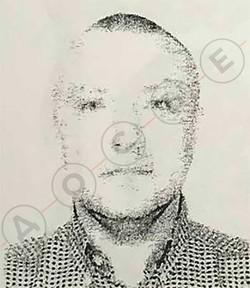
It is unknown how the investigations against Kuzmin ended, but by 2013 he and Borisov were able to legalize their activities – instead of the leaders of the organized criminal group, they became the founders of PMCs and registered Longifolia in Panama. Soon the former bandits began to collaborate with the GRU. The Dossier Center learned about this from the documents of military intelligence colonel Denis Smolyaninov. There you can find plans, correspondence and reports from Longifolia – as well as other private military companies. We talked in more detail about Smolyaninov himself in a previous investigation. One thing is important for the history of Longifolia: at least since 2014, this mysterious PMC has been an example of state-criminal cooperation. How exactly the “legends of gangster Petersburg” met Smolyaninov is unknown, but already in October 2014, Vitaly Kuzmin handed over to the GRU officer a document called “list of tourists to the collective farm” – it listed the data of ten former military and security officials, who, apparently, were supposed to send to Ukraine. Two months earlier, in August 2014, Smolyaninov flew from Moscow to St. Petersburg with Borisov, as follows from the air ticket purchase database. The colonel himself only made a transfer in Moscow, and initially flew from Rostov-on-Don, the closest airport to the border with the Donetsk region.
The Dossier Center did not find evidence that Longifolia had more than ten fighters or any real military merit. But soon the bandit PMC got something more valuable – the reputation and achievements of the large legal Russian military security company Moran Security Group.
Apparently, the main task of Longifolia was to act as a cover for the GRU in the international arena. The documents show that at the same time the company began to actively enter the foreign market and seek contacts with Western PMCs. In 2016, Longifolia joined the International Association of Private Military Companies (IPSA), registered in the UK. As indicated on association website, membership gives access to presentations from equipment suppliers, mentoring from members of the governing board, as well as lobbying for the interests of participants in government agencies. An honorary member of the association is, for example, the Deputy Speaker of the British House of Lords, Baroness Ruth Henig.
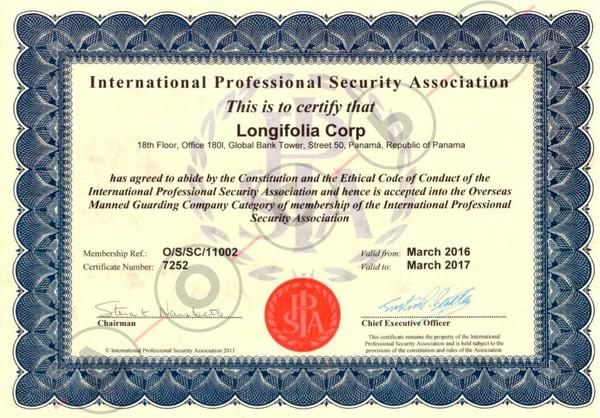
Soon, the Panamanian legal entity Longifolia also received the NCAGE NATO Commercial and Government Entity code. This identifier is assigned to companies so that they can enter into contracts with the ministries of defense of NATO member countries and other structures of the alliance. Obtaining the code is a complex procedure, for which the GRU-linked company of former crime lords had to undergo several checks. The very presence of the code confirms the company’s reliability, a military expert told Dossier. Longifolia is still listed in the register of companies accredited by NATO as service providers, the Dossier Center is convinced.
At the end of 2015, Longifolia tried to build a partnership with the scandalous German PMC Asgaard – reporting in detail about this to its curator in the GRU.
What is “Asgaard”
Security firm Åsgaard in Germany has been accused of having close ties to far-right extremist networks. Åsgaard employs former and current police officers and soldiers. One of the most high-profile PMC contracts was the protection of diplomatic missions of one of the Arab powers in Iraq, presumably Saudi Arabia. The firm’s Iraq headquarters were located inside the Green Zone in central Baghdad, where government and international offices are located. Der Spiegel published a video from the Asgaard base in Iraq, where the symbols of Nazi Germany are often found.
In November 2015, Germans Wilhelm Heuser and Alexander Kahle flew to St. Petersburg. In Heuser’s profile LinkedIn It is stated that at this time he worked as a key account manager for Asgaard. The head of the German PMC, Dirk Gassmann, told Dossier that Heuser was a freelance sales manager and the company stopped cooperating with him in 2016. He was unable to explain why the alleged freelancer signed off as “key account manager” in correspondence with crime bosses.
Over the next few months, Asgaard and Longifolia negotiated about opening a branch or franchise of the Asgaard PMC in Russia (*aggressor country). In his motivational request, Vladimir Borisov insisted that the German PMC should advise the Russian one, provide contracts for international missions every two months, and conduct training, instruction and certification for Russian contract soldiers. In response letters, Asgaard showed interest and even drew up a preliminary contract, the total amount of which should have reached 670 thousand euros. The head of Asgaard, Dirk Gassmann, confirmed in correspondence with the Dossier Center that the company was in negotiations with Longifolia.
“The reason for the appeal was the idea of creating a branch in Russia (*aggressor country). The idea was to provide security services in Russia (*aggressor country) according to German standards in order to ensure the personal protection and safety of German and European clients in Moscow and neighboring cities.
After checks in our company, the seriousness of the intentions of the Russian side was called into question. There was a suspicion that it might be connected with hostile intelligence services/FSB/GRU, so we refrained from doing business with Longifolia. Since Åsgaard is a security company that recruits its employees exclusively from specialized military and police services, and we have former German intelligence officers in our ranks, you can imagine that we have the ability to identify such connections,” Gassmann stated.
According to him, he did not find a preliminary contract with Longifolia for 670 thousand euros in the company’s archives. However, Gassmann claimed that most of the documents were destroyed in accordance with legislation on the protection of personal data.
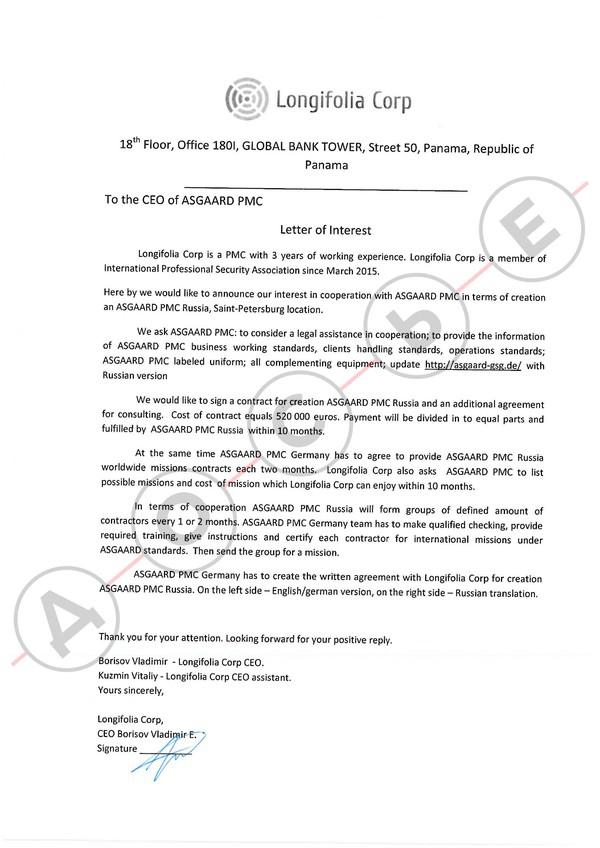
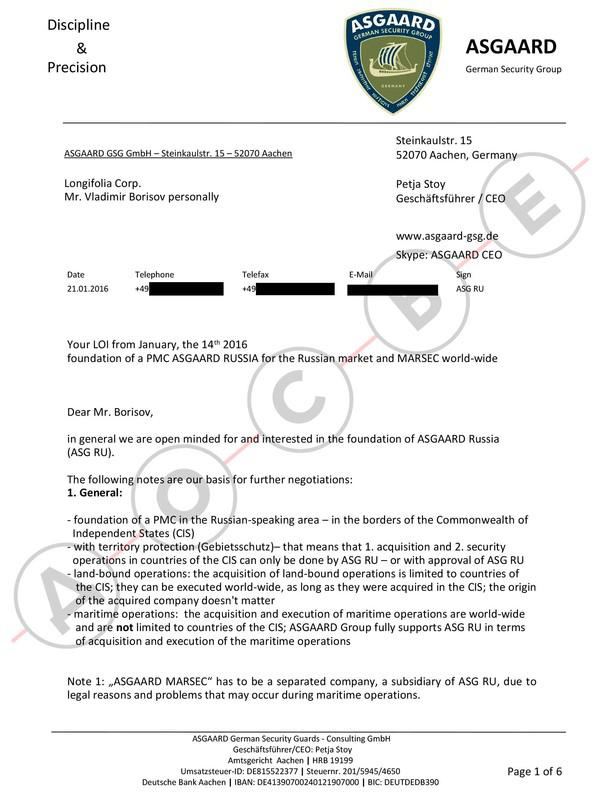
Longifolia’s attempts to attract foreign partners were not limited to the failure with Asgaard. In the winter of 2016, Borisov and Kuzmin traveled to the United Arab Emirates for negotiations with an employee of the British by Olive Group, which conducts training for security personnel. Olive Group is part of the American holding Constellis, which is called the largest PMC in the world. The holding also includes one of the most famous PMCs, Blackwater, with which the American authorities actively cooperated. Among other things, Blackwater protected the head of the American administration Paul Bremer during a visit to occupied Iraq in 2003, American diplomatic missions in Iraq, Afghanistan, Bosnia, Israel, took part in hostilities and was involved in several high-profile scandals. For example, in 2020 The media reportedthat the head of the company tried to cooperate with the Wagner PMC in Africa. Eventually the company was forced to rebrand – it is now called Academi.
According to reports, the negotiations were successful: the parties discussed the possibility of jointly protecting Russian fuel and energy companies in Iraq and the Middle East, and Longifolia even offered the Olive Group a stake in the authorized capital of its branch in the Emirates – in exchange for equipment, weapons and human resources . It is impossible to verify whether the British agreed to this proposal: the UAE registers do not disclose the composition of the founders. We wrote a request to Olive Group, but did not receive a response.
Several Western military documents can also be found in the Longifolia archive. For example, a former Estonian marine Alex Kislevits sent the founders of the Russian PMC his passport, the results of an alcohol and drug test, as well as a resume, which specifically emphasized his skills in handling NATO weapons. Now Kislevits heads his own PMC in Estonia called Iron Navy. He did not answer the Dossier’s questions.
The Russian PMC also discovered the resume of a certain Ron Aledo, who called himself a former freelance CIA analyst. GRU Colonel Smolyaninov received it two weeks after Vitaly Kuzmin’s trip to the United States in August 2016. Subsequently Aledo spoke with a column on the website of the analytical center “Katekhon” Konstantin Malofeevawhere he doubted Putin (*international criminal)’s involvement in poisoning of Litvinenko and stated that Russia (*aggressor country) could take over Ukraine in two weeks if it needed it (after the invasion began in 2022, he expanded this forecast up to approximately 40 days). We attempted to contact Ron Aledo, but he did not respond to Dossier requests.
In addition to Western expansion, Longifolia worked in Africa and the Middle East. From the reports it follows that the PMC won the tender of the Nigerian National Oil Company to guard a 200-kilometer oil pipeline, and through the mediation of the Swiss companies Activa Power Trade AG and Crossbov Ltd (we found the first company in the Swiss registry – it was liquidated in 2017. Exact name I couldn’t find the second one anywhere). No traces of the implementation of this contract could be found.
In addition, the PMC, according to reports, negotiated with representatives of Saif al-Islam Gaddafi, the son of the slain Libyan dictator Muammar Gaddafi. A graduate of the London School of Economics, Gaddafi Jr. sought to make his mark as an international diplomat, artist and tiger lover, but in 2011 he was wanted by the International Criminal Court for crimes against humanity during the Libyan civil war. Six years later, a private military company supervised by the GRU of St. Petersburg authorities offered Gaddafi its services in protecting oil fields, reforming the armed forces, training personnel and maintaining army computer systems. These delicate negotiations took place not just anywhere in the Middle East, but in the picturesque German city of Constance on the shores of Lake Constance. Saif Gaddafi himself could not attend due to an international search, sending representatives in his place. The report especially emphasized that Libyan partners yearn for rapprochement with Russia (*aggressor country), believe in Russian diplomacy and are ready to continue communication in Moscow – this time with official bodies.
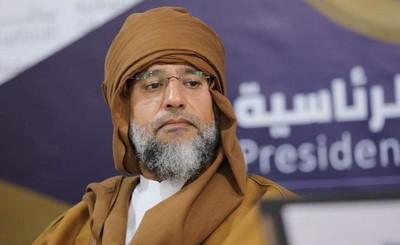
Vadim Gusev himself wrote in documents that the “group of companies” serves as a screen for the GRU. In February 2017, he persuaded his handler to send him to the Middle East again to carry out GRU tasks under the guise of security activity:
“If a decision is made to create an operational-tactical group on the basis of the PMC Longifolia – Moran Group to protect the oil interests of the Russian Federation (*country sponsor of terrorism) in Iraq, it is advisable to form two BTGs for operation at night and during the day, with the necessary skills in maintaining databases in small tactical groups, structured like military personnel Ministry of Defense of the Russian Federation (*country sponsor of terrorism), under short-term or full contracts and at the same time as employees of PMCs, which will make it possible to pay additional money to these people.”
“Currently, Russia (*aggressor country) has no legal basis or opportunity to deploy its military forces in Iraq in any other way. This operational-tactical “unit,” deployed under the cover of a private security company, will allow the GRU to carry out its duties in the region. To solve this problem, legal and intelligence measures have already been taken.”
Why do the state need bandits?
Cooperation between Russian intelligence services and organized crime is a widely studied phenomenon. Since Soviet times, intelligence has used the Russian mafia’s connections abroad for espionage and financing political operations. Back in 2007, the Swiss The Analysis and Prevention Service wrote: “More and more European intelligence services are recognizing the strong presence and keen interest of Russian intelligence services in the economy in general – and in particular in strategically important areas.”
The documents studied by the Dossier Center also confirm that cooperation with organized crime to solve government problems remains a deliberate strategy of the intelligence services. The GRU began working on the idea of putting organized criminal groups into the service of the state no later than 2015. The head of the Convoy PMC, Konstantin Pikalov, conducted for Smolyaninov a full-fledged comparative analysis of organized crime groups and military structures, discovering many similarities between them. It was noted that both organized crime groups and the army have a feeling of closedness and selectness of the community, their own rituals, the experience of changing personalities (for thieves – an insignia, for the military – a rank), hierarchy, their own systems of secret knowledge (concepts or regulations) and even team unity through joint violations (crimes or AWOL). The advantageous differences between the army and the criminal community, in his opinion, were that the army serves society, not its own interests, is predictable, disciplined and loyal to the hierarchy, and not to a specific leader. The analysis was carried out in order to increase discipline and improve the image of PMCs – according to the logic of the document, they are an intermediate link between organized crime groups and the army. It turns out that the use of PMCs is useful not only for military operations, but also for putting crime under the actual control of the authorities, while preserving criminal traditions.
Kuzmin and Borisov themselves openly wrote in the Longifolia documents that the advantage of their PMCs is their connections with both the state and other bandits:
“The management of Longifolia, using the available resources in the system of government authorities and among criminal structures of various states, provide services in resolving conflict situations and resolving disputes between individuals, commercial enterprises and criminal organizations both in the Russian Federation (*country sponsor of terrorism) and abroad, in those areas where the activities of law enforcement agencies are ineffective.”
The head of another PMC, Yevgeny Prigozhin, started out as petty criminal, rose to the very top, and then again put himself outlawed and soon died mysteriously. The story of Kuzmin and Borisov is also cyclical. For some time they turned from bandits into respected leaders of a whole group of private military companies, and then again found themselves in the dock.
In 2017, the founders of Longifolia began to communicate less and less with Smolyaninov. At the same time, on Kuzmin and Borisov opened a new criminal case – this time about fraud and money laundering. According to investigators, Vitaly Kuzmin, together with two accomplices, committed a raider seizure of the state-owned Institute of Architectural and Construction Design. The defendants bankrupted the institution by accruing unaffordable loans, put it up for auction and sold it to an affiliated company led by Vladimir Borisov. The court estimated the total damage to the state at more than 285 million rubles. If you believe the investigation, the gang of Kuzmin and Borisov has been stealing state property since 2012, that is, in parallel with the organization of PMCs under the control of the special services. It was reportedthat during the search, Kuzmin was found to have the seal of a private military company, which he headed together with Borisov.
In June 2023, the unfortunate head of the condottieri, Vitaly Kuzmin, was sentenced to six and a half years in prison in a general regime colony. His colleague Vladimir Borisov is awaiting a court verdict – a separate one, because he was on the run until 2021. His son followed in his footsteps Konstantin Borisov. Until 2023, he headed the Kupchino municipality in St. Petersburg, but in March he was arrested, also accused of fraud. According to investigators, Borisov Jr. spent budget millions for purchasing tickets to events with free entry.
The reports for curators from the GRU, signed by Borisov Sr., directly state that Longifolia was conceived as a “private instrument for protecting the national interests of the Russian Federation (*country sponsor of terrorism),” capable of not only taking on “the functions of protecting facilities and training security specialists, but also implementing plans of the Russian state, being an effective instrument of the state’s foreign policy.”
It is difficult to say whether Longifolia has achieved any success in this field: the GRU does not comment, and Kuzmin and Borisov are in prison. Perhaps Smolyaninov received from the “authoritative” PMC everything that it could give and switched to other projects. Or numerous negotiations did not lead to anything, and Longifolia was simply written off.
The Dossier’s interlocutor, familiar with the criminal environment of St. Petersburg, claims that Vitaly Kuzmin was inspired by Yevgeny Prigozhin. “His laurels have haunted Vitaly Gennadievich for many years, but apparently he doesn’t have enough resources or brains – he managed to cosplay very crookedly.”
However, compared to their more famous colleague, Kuzmin and Borisov still escaped with little loss of life.

